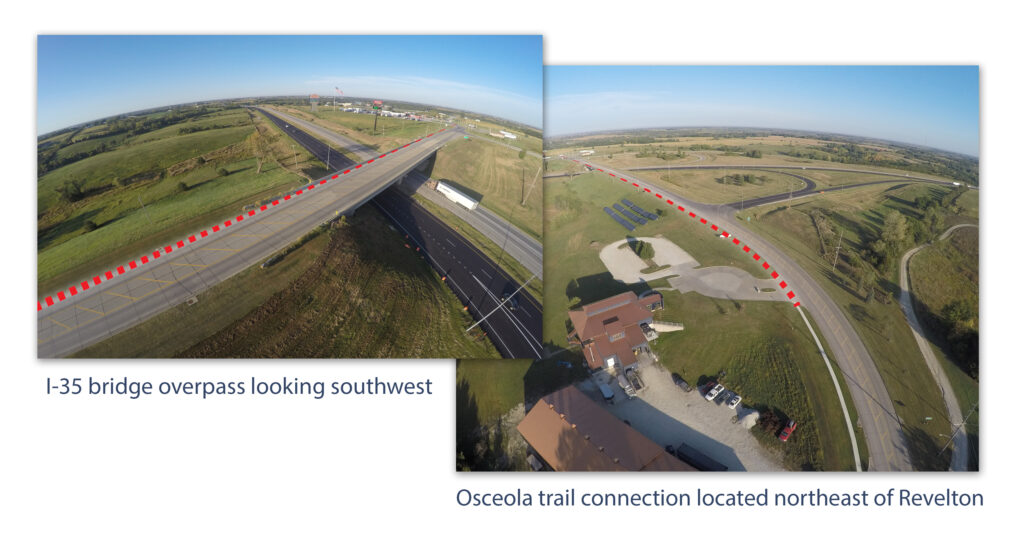At the September 11th board meeting for the Clarke County Development Corporation (CCDC), Osceola City Administrator, Ty Wheeler made a request for a share of funding previously committed to a planned effluent pipeline to be divided to cover fees associated to the design of a federally funded extension for the ever-growing Osceola trail system. The design of the trail extension would carry it from the Q-Pond and adjoining areas across the I-35 bridge on Clay Street at exit 34, eventually connecting to Lakeside Hotel and Casino and West Lake amenities.
Images below illustrate the proposed trail extension (click to view larger in your browser):
The decision to divide the $106,200 for the trail system design fees out of the original $718,600 grant for the treated effluent pipeline offered two solutions for the board to consider. Initially, the timing of the federal grant funds provided a restricted window of opportunity. While construction of the trail would be funded by up to $600,000 of the Transportation Alternatives Program (TAP), the call for applications asked for a design which would not be funded by the TAP grant. This was the reason for the city bringing the request to the CCDC.
The second consideration for the board was the ongoing engineering studies and regulatory delays of the treated effluent pipeline project that was approved in May. After the initial pipeline grant was approved by the CCDC, city wastewater engineers and staff began their studies as required by the Iowa Department of Natural Resources (IDNR). The IDNR advised the chloride levels in the treated effluent were too high to use for irrigation purposes. The city, consulting engineers, and industrial partners are currently studying ways to mitigate the chloride loading.
“As we develop processes to address the chloride loading, we thought it would be prudent to use the previously committed funds instead of asking for a new grant for the trail system design,” said Wheeler.
Projections for the execution and construction of the effluent pipeline has been estimated to be anywhere from 18 to 24 months. Considering that delay, the City’s proposal divided the funds for the trail design out of the original grant to help take immediate action on the trail system and the application for the federal TAP grant.
While suggestions to completely retract the original pipeline grant until final treatment solutions were decided on were discussed, ultimately the board chose to keep the pipeline funding in place, knowing the city would take on the responsibility for any future funding shortfall due to the split-out.
The new grant for $106,200 will help the city design and illustrate their trail extension concept, including how the trail will be taken up Clay Street, utilizing excess median space across the bridge at exit 34 to add a safe walking and biking path on the south side of the structure. Then, the design will continue the trail from the I-35 overpass, adjacent to the Pilot parking area and on to Lakeside’s front door and possibly extend to West Lake.
With the approval of the grant, the city will embark on the design for the trail extension and then apply for the TAP Grant that could result in up to $600,000. The final TAP Grant amount will determine the amount of trail that can be added in this phase.
“Initially, we’re focused on getting the trail across I-35,” said Wheeler. “But ultimately we’d like to connect East Lake with West Lake and beyond, making Osceola’s trail system a real gem of south-central Iowa.”

